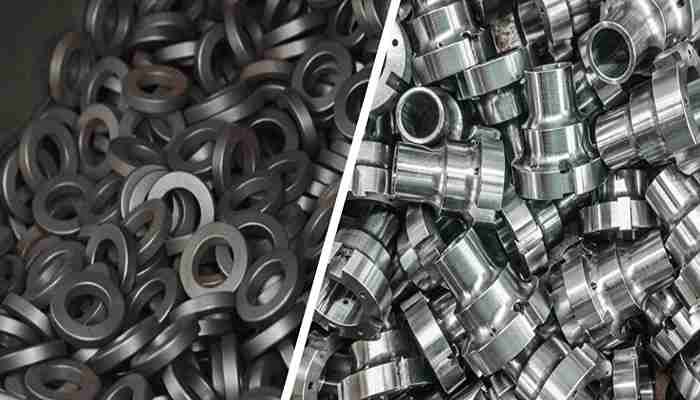Choosing between stainless steel and Inconel tubes depends heavily on your industrial needs, environmental conditions, and budget. Both materials offer unique advantages suited for specific applications. This guide compares their key characteristics, helping you make an informed decision.
Welcome to Moksh Tubes & Fittings LLP
Monday - friday : 8:00 AM to 7:00 Pm
-
Call Us On
+91 97695 84950
-
Mail Us @
info@mokshtubes.com
Stainless Steel vs Inconel Tubes

Stainless Steel vs Inconel Tubes
Composition Comparison
| Material | Nickel | Chromium | Iron | Carbon |
|---|---|---|---|---|
| Stainless Steel (304 Grade) | 8 - 10.5% | 18 - 20% | Balance | 0.08% |
| Inconel (600 Grade) | 72 - 78% | 14 - 17% | Balance | N/A |
Mechanical Properties
| Property | Stainless Steel 304 | Inconel 600 |
|---|---|---|
| Tensile Strength | 520 MPa | 690 MPa |
| Yield Strength | 215 MPa | 275 MPa |
| Elongation | 40% | 40% |
| Hardness | 70 HRB | 90 HRB |
Fabrication & Cost Considerations
| Aspect | Stainless Steel | Inconel |
|---|---|---|
| Machinability | Easy to machine and weld | Difficult; requires specialized tooling |
| Fabrication Cost | Low to moderate | High (5-10x more expensive) |
Performance Characteristics
Temperature Resistance
- Stainless Steel: Maintains strength up to ~870°C (1600°F)
- Inconel: Maintains integrity up to ~1093°C (2000°F)
Corrosion Resistance
- Stainless Steel: Good general corrosion resistance; best for mild to moderate environments.
- Inconel: Superior resistance to acids, saltwater, chlorides; ideal for harsh chemical and marine environment
Recommended Applications
| Stainless Steel Tubes | Inconel Tubes |
|---|---|
| Food processing equipment | Aerospace (jet engines, gas turbines) |
| Construction and structural components | Chemical processing (extreme conditions) |
| Chemical processing (moderate conditions) | Power generation |
| Household and kitchen appliances | Heat exchangers |
| General industrial equipment | Marine engineering |
| Nuclear industry | |
| Oil and gas (sour gas environments) |
Material Selection Criteria
| Choose Stainless Steel When | Choose Inconel When |
|---|---|
| Cost is a primary concern | Extreme temperature resistance is crucial |
| Operating conditions are moderate | High corrosion resistance is mandatory |
| Easy fabrication is required | Performance in harsh environments is critical |
| General corrosion resistance suffices | Failure is not an option |
FAQ's
What is the main difference between stainless steel and Inconel tubes?
Stainless steel contains less nickel and chromium than Inconel, making it less resistant to extreme heat and corrosion. Inconel is preferred for high-temperature, highly corrosive environments.
When should I use stainless steel tubes instead of Inconel?
Use stainless steel tubes for moderate operating conditions, where cost and ease of fabrication are priorities, and corrosion levels are not severe.
Are Inconel tubes more expensive than stainless steel tubes?
Yes, Inconel tubes cost 5 to 10 times more than stainless steel due to their superior performance and specialized manufacturing requirements.
Can stainless steel tubes be used in marine environments?
Stainless steel offers good corrosion resistance but may be vulnerable to certain marine corrosives. Inconel is recommended for harsher marine and chemical environments.
What industries typically use Inconel tubes?
Inconel tubes are commonly used in aerospace, power generation, chemical processing, marine engineering, nuclear, and oil and gas sectors where extreme conditions exist.
Conclusion
Selecting between stainless steel and Inconel tubes hinges on your industrial requirements, environmental conditions, and budget constraints. Stainless steel is ideal for cost-effective applications with moderate conditions, while Inconel excels in extreme environments demanding superior strength and corrosion resistance.
Recent Blogs
-

Why Hastelloy Weighs More Than Stainless Steel
august 14, 2025
-
The Role of High Performance Alloys in Desalination Plants
august 14, 2025
-
India’s Stainless Steel Exports – Moksh Tubes Global Reach
august 14, 2025
Locate Us
info@mokstubes.com
Office Address: Hinglaj Bhavan, Gulalwadi Mumbai, Maharashtra. 400004
Office Address: 6/A, Ground Floor, Rajwanti Mansion, Khetwadi Mumbai
Office Address: 95/95A, Dawood Baug, Sukhlaji Street, Kamatipura Mumbai
Office Address: 92E, Plot No. 3, New Tank Bunder, Darukhana, Mumbai, Maharashtra- 400 010.
get in touch
Let’s forge a connection — contact our team today.
Contact Us
AT Moksh Tubes & Fittings LLP, we’re dedicated to making your purchases seamless offering expert advice, a wide inventory of certified products, and global support for every order, large or small.
Get in Touch

